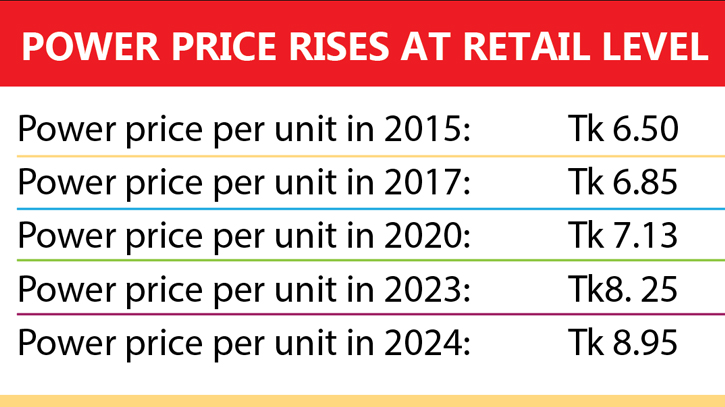
Photo : Messenger
The government, bypassing the regulatory procedure, issued executive orders on Thursday to increase the power price by 8.44 percent per unit just before the onset of Ramadan.
This move has drawn criticism from experts who express deep disappointment over the decision. They argue that the populace is already grappling with inflation and the escalating cost of daily necessities like naseberries. The hike in power prices will only exacerbate the burden on the people, particularly those belonging to middle- and lower-income brackets. Under the new rate, the price of electricity per unit has seen an average increase of Tk 0.70. This revised pricing structure will take effect from the current February billing cycle.
The Ministry of Power, Energy, and Mineral Resources issued a gazette on Thursday, officially setting the new electricity prices. For residential consumers, the price has risen by Tk 0.28 per unit, while the highest users will experience an increase of Tk 1.35 per unit. Additionally, the cost of electricity used for irrigation purposes has seen an increase of Tk 0.43 per unit.
Prof Shamsul Alam, a prominent energy expert of the country and advisor for Consumers Association of Bangladesh (CAB) told the Daily Messenger “The price hike is not justified as it has been done by the executive orders. The ministry did not think about the people, they just follow the IMF’s instruction.” He added, people are already under pressure of the price hike and current power price will impact all the commodity prices.
As a result of the price hike, retail electricity prices per unit have increased from an average of Tk 8.25 to Tk 8. 95. And at the wholesale level, the price of electricity per unit has been increased by an average of 5 percent. The price of wholesale electricity has increased from Tk 6.70 per unit to Tk 7.4.
Prof M Tamim said “The government is under pressure of paying the outstanding bill of the imported fuels. This unexpected price hike has been caused by massive import tendency.”
State Minister for Power and Energy Nasrul Hamid told the Daily Messenger “We want to phase out the subsidy support from the power and energy sector. Besides, world energy market also gets unpredictable. So, there is no other option but hiking the price now.”
According to the new rate, the price of electricity per unit of irrigation has been increased from Tk 4.82 to Tk 5. 25. Low voltage (230/400 volt) commercial and office average price increased from Tk 11.93 to Tk 13.1.
In case of medium pressure (11 KV) it has been increased at an average Tk 11.63. In case of high voltage (33 KV) industries, the average per unit has been increased from Tk 9.90 to Tk 10.75. And for very high pressure (132 and 230 kilo volts) Tk 9.68 to Tk 10.66. Apart from this, the price of electricity per unit in educational, religious, hospital and charitable institutions has been increased from Tk 6.97 to Tk 7.55.
Meanwhile, the electricity prices have been increased 12 times at the wholesale level and 14 times at the retail level in the last decade and a half. In the last financial year (2022-23), PDB made a loss of Tk 43,539 crore in subsidy.
Earlier, Bangladesh Energy Regulatory Commission (BERC), the regulatory body of this sector used to fix the price of electricity through public hearing. By amending the law in December 2022, the Ministry of Power, Energy and Mineral Resources took over the power to raise prices along with BERC. Since then, the Power Division has been increasing the prices by executive order.
Messenger/Fameema








